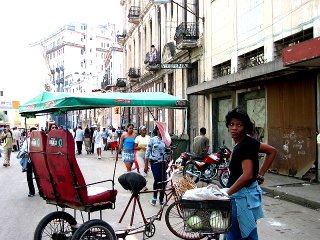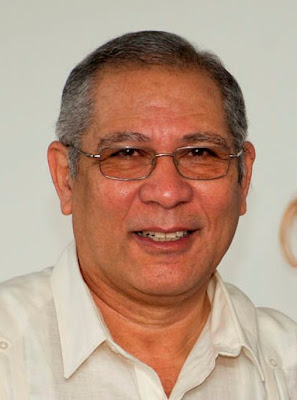ENCUESTA EN LA HABANA Y SANTIAGO REVELA INSATSIFACCIÓN // GALLUP POLL: 47% OF CUBANS APROVE OF CASTRO REGIME
Nota del Blogguista
Estos resultados hay que verlos bajo la luz de que en un sistema totalitario como es el régimen cubano donde todo depende del régimen: desde darte el permiso de salida del país, pasando por el sustento familiar ( léase puesto de trabajo, salario, etc.,) hasta ir a la cárcel sin haber cometido ningún delito mediante la aplicación del delito de peligrosidad, y el miedo existente en TODA la sociedad cubana a la delación mediante los ¨chivatos¨ y ¨segurosos¨ , estas cifras del 40 % de desaprobación sobre el liderazgo de los que desgobiernan la Isla y el 13 % de abstensión ( en un régimen donde la abstención, el gobierno la ve en el mejor de los casos como una negativa apatía hacia el sistema) son cifras muy altas y esconden una desaprobación muchísimo mayor.
Nunca debemos juzgar los resultados de las encuestas en los sistemas dictatoriales con la misma veracidad que lo hacemos en los regímenes democráticos donde se respetan todas las libertades.
Finalmente: Observemos que la misma noticia publicadas por El Miami Herald y El Nuevo Herald, muestran una evidente y grosera manipulación de la misma, ya que están redactadas y dirigidas para comunidades diferentes pese a que ambos diarios están íntimamente relacionados.
Encuesta en La Habana y Santiago revela insatisfacción
FOSTER KLUG
Associated Press
WASHINGTON - Sólo uno de cada cuatro cubanos entrevistados en las dos ciudades principales de la isla está satisfecho con su libertad para elegir lo que hace con su vida, según una encuesta dada a conocer el jueves.
 Cuando se les preguntó sobre el desempeño del liderazgo de Cuba, cerca del 40% de los residentes encuestados en ambas ciudades dijo que lo desaprobaba, según el sondeo de la firma Gallup. Ni siquiera la mitad dio su aprobación. Las preguntas se aplicaron a 600 personas en La Habana y a 400 en Santiago.
Cuando se les preguntó sobre el desempeño del liderazgo de Cuba, cerca del 40% de los residentes encuestados en ambas ciudades dijo que lo desaprobaba, según el sondeo de la firma Gallup. Ni siquiera la mitad dio su aprobación. Las preguntas se aplicaron a 600 personas en La Habana y a 400 en Santiago.El sondeo se realizó en momentos en que Cuba enfrenta una encrucijada, con su líder Fidel Castro enfermo e interrogantes sobre si se recuperará o lo que sucederá si no lo hace. El gobierno autocrático de Castro ha recibido amplias críticas, aunque tiene simpatizantes, incluyendo al presidente venezolano Hugo Chávez.
Gallup realizó la encuesta en sólo dos ciudades debido a la dificultad extrema para transportarse en la isla y por la ausencia de una manera confiable de proveerse de alimentos y provisiones, informó Carlos Denton, presidente de CID Gallup Central America. Los resultados no pretenden ser representativos de los más de 11 millones de habitantes de Cuba, sino sólo un vistazo a los casi tres millones de personas que viven en La Habana y Santiago, informaron funcionarios de Gallup.
De acuerdo con la encuesta:
_Cuando se les preguntó sobre el "compañero ideal" para que Cuba incremente sus lazos comerciales, Estados Unidos fue el más mencionado, seguido por China y Venezuela. Washington mantiene un embargo comercial a la isla desde hace décadas.
_Casi todos los entrevistados dijeron que pensaban que el sistema de salud cubano era accesible para cualquiera que lo necesitara, sin importar su estatus económico.
_Casi todos dijeron que los cubanos que querían estudiar tenían acceso a la educación, sin importar su situación económica.
_Sólo cerca del 40% dijo que los cubanos pueden salir adelante trabajando duro.
_Cerca de dos tercios de los que respondieron y que tienen trabajo dijeron estar satisfechos con éste.
Las entrevistas fueron realizadas por diez personas de otros países latinoamericanos junto con 10 cubanos, la mayoría estudiantes universitarios con los que Gallup ya había trabajado. Los trabajadores procuraron mantenerse alejados de los hogares donde hay personas encargadas de reportar al gobierno sobre las actividades vecinales. Tales hogares, informó Gallup, están casi en cada cuadra.
Las entrevistas no fueron monitoreadas por el gobierno cubano, indicó el grupo encuestador, el cual no solicitó permiso gubernamental para realizar el sondeo.
Jesús Ríos, director de investigación de Gallup para Latinoamérica, dijo que las preguntas eran las mismas que su compañía usa en encuestas similares en todo el mundo y no fueron hechas específicamente para Cuba.
La encuesta se realizó entre el 1 y el 15 de septiembre con residentes mayores de 15 años. El margen de error fue de más o menos tres puntos porcentuales para la muestra total.
© 2006 AP Spanish and wire service sources. All Rights Reserved.
http://www.miami.com
Publicado en Inglés
******************
Posted on Fri, Dec. 15, 2006
CUBA
Gallup poll: 47% of Cubans approve of Castro regime
An independent poll of Cubans shows they want more freedom and opportunities, but many still support Fidel and Raúl Castro.
BY PABLO BACHELET
pbachelet@MiamiHerald.com
WASHINGTON - A rare independent poll of Cubans by the U.S.-based Gallup company shows Cubans on the island want more freedom and economic opportunities and support the Castro brothers by a seven-point margin.
The Gallup poll released Thursday showed that 47 percent of the Cubans polled approved the job performance of their leaders and 40 percent disapproved.
Gallup officials said they did not seek Cuban government permission for the poll, but that authorities made no effort to stop it.
The poll is only the second carried out by outsiders in Cuba since 1994, when the Miami Herald commissioned CID-Gallup, the Costa Rican affiliate of Gallup, to carry out a similar poll.
Polling in Cuba is considered sensitive because the communist government suppresses dissent, sometimes brutally. The government monopolizes the media and only the Communist Party is legal.
The most recent survey was conducted Sept. 1-15, well after Fidel Castro had handed power to his brother Raúl following surgery. Castro is reported to be suffering from terminal cancer, and has not appeared in public since July.
The executive summary of the poll -- part of a broader project comparing attitudes in some 130 countries, which Gallup plans to release in portions -- describes the results as a ``fascinating portrayal of a populace living with the paradoxes of a communist regime.''
 Only one in four Cubans declared to be satisfied with their levels of personal freedom. By contrast, four out of every five Latin Americans said they were satisfied with their personal freedom.
Only one in four Cubans declared to be satisfied with their levels of personal freedom. By contrast, four out of every five Latin Americans said they were satisfied with their personal freedom.Despite a barrage of criticism of U.S. policy from Cuban leaders and a four-decade-old embargo, 44 percent of Cubans said they considered the United States an ''ideal partner'' for more trade -- far ahead of 17 percent for second-place China and 15 percent for Venezuela.
Eric Nielsen, a spokesman for Gallup, said Cubans may be responding to their relatives' description of America as a land of opportunity and the Havana government's assertion that more U.S. trade would improve the island's lot.
Only 42 percent of Cubans believed they could get ahead by working hard, far less than the 77 percent of Latin America who held that opinion. But Cubans held their health and educational systems in high regard. For instance, 96 percent said healthcare was available to all regardless of income, compared with 42 percent who felt the same way in Latin America.
Cubans also seemed less happy than their Latin American peers, with 62 percent saying they laughed or smiled a lot, compared with 82 percent for the rest of the region. But Cubans overwhelmingly used positive terms like creativity, friendliness and optimism to describe themselves.
The margin of error is plus or minus 3 percentage points.
The survey was carried out by a team of Central American supervisors and Cuban college students who contacted 600 people in Havana and 400 in Santiago aged 15 or older. The results were e-mailed from Internet cafes every evening and the original documents were then burned to ensure they did not fall into the hands of authorities. Poor infrastructure made it impossible to conduct the survey in the rest of Cuba, organizers said.
Gallup officials said pollsters found that despite the government controls, Cubans were still eager to respond to questioners, who spent up to one hour in each home.
To maintain a low profile, the poll takers avoided the homes of the neighborhood chiefs of Cuba's notorious Committees for the Protection of the Revolution.
The Miami Herald's CID/Gallup poll in 1994 showed that only 3 percent of those surveyed identified politics as Cuba's main problem, 38 percent said freedom was the most important value for society and 50 percent chose equality.
© 2006 MiamiHerald.com and wire service sources. All Rights Reserved.
http://www.miami.com
*****************
Posted on Fri, Dec. 15, 2006
POLL FINDINGS
• 47 percent of the Cubans polled approved the job performance of their leaders, and 40 percent disapproved.
• Only one in four Cubans declared they were satisfied with their levels of personal freedom.
• 44 percent of Cubans said they considered the United States as an ''ideal partner'' for more trade.
• 42 percent of Cubans believed they could get ahead by working hard.
• 96 percent of Cubans said healthcare was available to all regardless of income.














0 Comments:
Publicar un comentario
<< Home